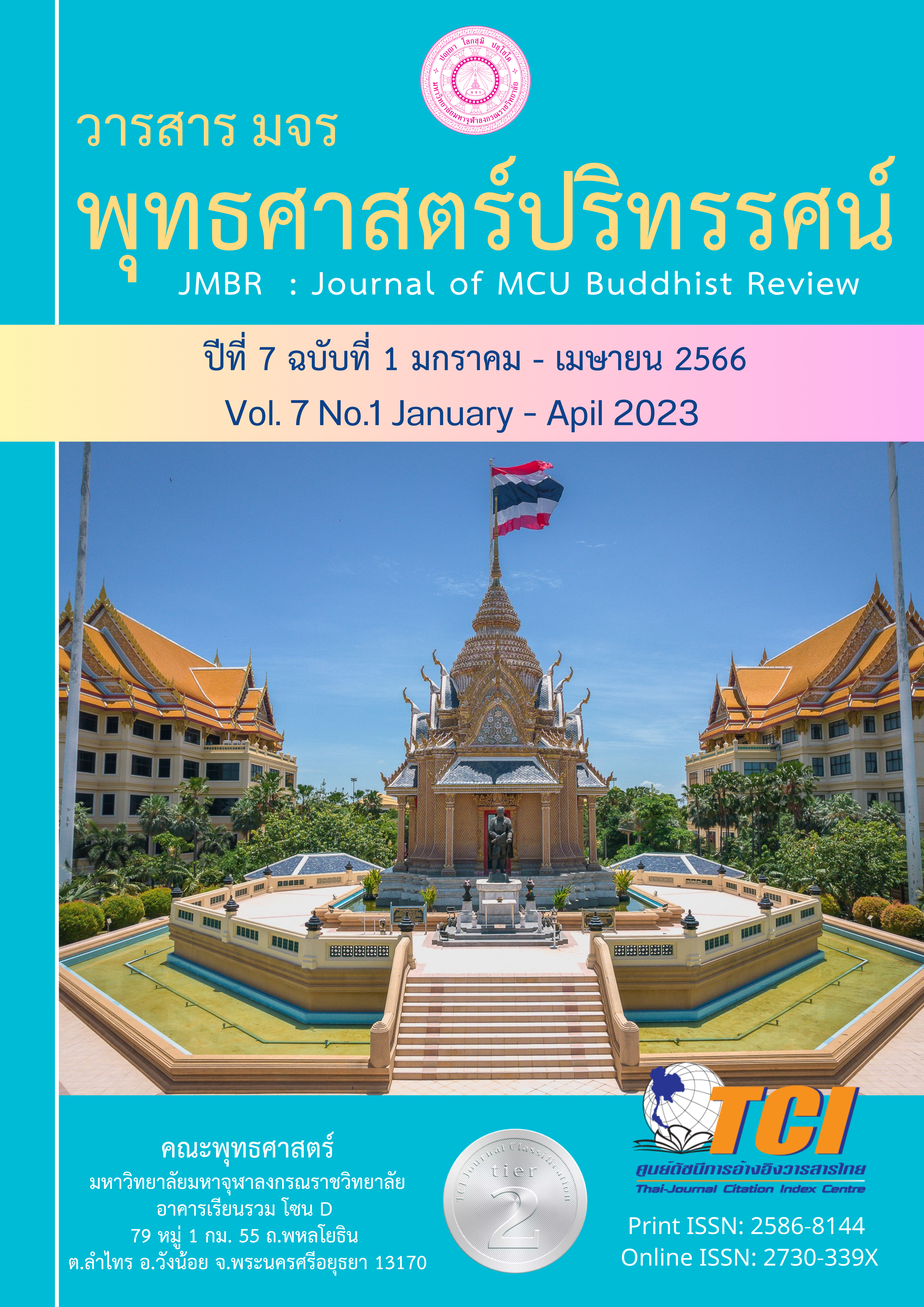อนุสาสนีปาฏิหาริย์: แนวทางการใช้ในการดำเนินชีวิตยุคดิจิทัล
Main Article Content
บทคัดย่อ
อนุสาสนีปาฏิหาริย์ คือการสั่งสอนเป็นอัศจรรย์ว่า ควรประพฤติปฏิบัติตลอดจนการปฏิบัติได้ผล คุณสมบัติของอนุสาสนีปาฏิหาริย์ คือ คำสอนที่เป็นจริง สอนให้เห็นจริง และนำไป ปฏิบัติได้ผลสมจริง ผลสำเร็จเกิดจากการใช้รูปแบบการสอน ได้แก่ ๑) เผยแผ่ด้วยการให้ได้ยินได้ฟังทุกวิถีทาง (หลักปริยัติธรรม) ๒) เผยแผ่ด้วยการทำทำสิ่งที่ดีและทำยากให้เขาดู (หลักปฏิบัติธรรม) ๓) เผยแผ่ด้วยการเป็นผู้มีความสุขให้เขาดู (หลักปฎิเวธธรรม) อาเทสนาปาฏิหาริย์ มี ๒ วิธีด้วยกัน คือ ๑. การสอนด้วยคำพูด สั้นๆ แต่ประทับใจหรือกินใจ ๒. การสอนด้วยการไม่พูด แต่ให้ลงมือกระทำการอย่างใดอย่าง หนึ่ง จนเกิดความรู้ด้วยตนเอง ซึ่งการนำหลักการสอนด้วยอนุสาสนีปาฏิหาริย์ไปใช้ในการดำเนินชีวิตจะสอดคล้องกับการใช้ชีวิตในยุคดิจิทัลเนื่องด้วยประชาชนสามารถรับฟังคำสอนด้วยการอ่าน การฟัง ทั้งในรูปแบบของการพบหน้า หรือทางออนไลน์ หรือ การลงมือนำหลักธรรมของพระพุทธศาสนามาใช้ในการดำเนินชีวิต การใช้จิตสมาธิในการมุ่งมั่นทำงาน หรือ การใช้หลักอริยสัจ 4 ในการทำให้ตนเองคลายทุกข์
Article Details

อนุญาตภายใต้เงื่อนไข Creative Commons Attribution-NonCommercial-NoDerivatives 4.0 International License.
- บทความที่ได้รับการตีพิมพ์เป็นลิขสิทธิ์ของวารสาร มจร พุทธศาสตร์ปริทรรศน์
- ข้อความใดๆ ที่ปรากฎในบทความที่ได้รับการตีพิมพ์ในวารสาร ถือเป็นความรับผิดชอบของผู้เขียนบทความ และข้อคิดเห็นนั้นไม่ถือว่าเป็นทัศนะและความรับผิดชอบของกองบรรณาธิการวารสาร มจร พุทธศาสตร์ปริทรรศน์
เอกสารอ้างอิง
ชมพูนุท ศรีจันทร์นิล. (2552). จิตวิทยาแนวพุทธ: แนวทางเพื่อการเยียวยา และพัฒนาจิตใจมนุษย์. วารสาร มหาวิทยาลัยหอการค้า. 29(4), 23-33.
ทิพากาญจน์ ประภารัตน์. (2558). การใช้อนุสาสนีปาฏิหาริย์เพื่อการเผยแผ่พระพุทธศาสนาของพระพุทธเจ้าใน คัมภีร์พระพุทธศาสนา. วารสารสันติศึกษาปริทรรศน์ มจร. 4(ฉบับพิเศษ), 284-300.
พระครูโกวิทสุตาภรณ์. (2565). การศึกษาเปรียบเทียบรูปแบบการเผยแผ่พระพุทธศาสนาของพระสงฆ์กับการเผย แผ่คริสต์ศาสนาของบาทหลวงเพื่อพัฒนาคุณภาพชีวิตในจังหวัดหนองบัวลําภู. วารสาร มจร พุทธศาสตร์ปริทรรศน์. 6(3), 33-45.
พระธรรมปิฎก (ป.อ.ปยุตฺโต). (2539). การศึกษาเพื่ออารยธรรมที่ยั่งยืน. กรุงเทพฯ: มูลนิธิพุทธธรรม.
พระพรหมคุณาภรณ์ (ป.อ.ปยุตฺโต). (2551). พจนานุกรมพุทธศาสตร์ ฉบับประมวลธรรม. กรุงเทพฯ: มหาวิทยาลัย มหาจุฬาลงกรณราชวิทยาลัย.
พระพรหมคุณาภรณ์ (ป.อ.ปยุตฺโต). (2556). พจนานุกรมพุทธศาสน์ฉบับประมวลธรรม. พิมพ์ครั้งที่ 24. กรุงเทพฯ: พระพุทธศาสนาของธรรมสภา.
พุทธทาสภิกขุ. (2521). การศึกษาคืออะไร. กรุงเทพฯ: สำนักหนังสือธรรมบูชา.
สมโภชน์ เอี่ยมสุภาษิต. (2560). ทฤษฏีและเทคนิคการปรับพฤติกรรม. พิมพ์ครั้งที่ 9. กรุงเทพฯ: จุฬาลงกรณ์มหาวิทยาลัย.
สิริวรรณ มิตต์สัตย์สิริกุล. (2565). การประยุกต์ใช้หลักพุทธธรรมในการส่งเสริมสุขภาวะของผู้สูงอายุจังหวัดน่านในสถานการณ์การแพร่ระบาดของโรคโควิด-19. วารสาร มจร พุทธศาสตร์ปริทรรศน์. 6(3), 21-34


